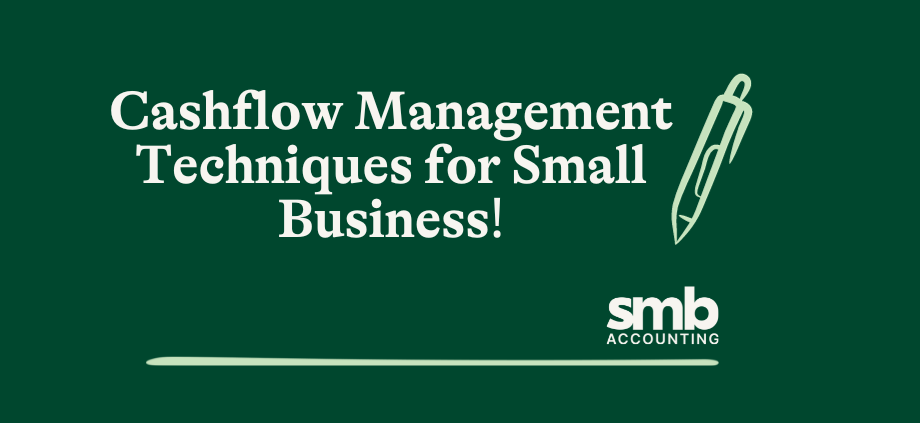Cash Flow Management Techniques for Small Business Success
Cash flow management is a critical component of successful small business operations and can directly influence financial stability, growth prospects, and longevity in the market. At SMB Accounting, we are dedicated to providing educational, informative, helpful, and unique content to help small business owners navigate the complexities of cash flow management, implement effective strategies, and unlock long-term success.
In this article, we will explore key cash flow management techniques designed to optimise the financial health of your small business, including budgeting, invoicing, expense tracking, and leveraging technology like Xero.
By understanding and mastering these techniques, small business owners can make informed financial decisions, maximise profitability, minimise risks, and adapt more efficiently to fluctuating market conditions.
Whether you are just starting your entrepreneurial journey or looking to improve your existing cash flow management processes, implementing effective cash flow management strategies is essential for sustainable business growth.
Let SMB Accounting guide you through cash flow management best practices, offering valuable insights, practical advice, and professional support to create a robust financial foundation for your small business’s lasting success.
Budgeting for Success: Plan, Monitor, and Adjust Financial Projections
A well-structured budget is crucial for managing your small business’s cash flow effectively. Budgeting involves creating financial projections of your income and expenses, enabling you to make strategic decisions in allocating resources, minimising costs, and driving profitability. Consider these budgeting best practices for small businesses:
- Set Realistic Financial Goals: Establish clear, achievable financial objectives based on your past performance, market trends, and business growth plans.
- Create a Detailed Budget: Outline your expected income and expenses for a specific period (e.g., monthly, quarterly, or annually), and categorise them appropriately (e.g., fixed and variable expenses).
- Monitor and Review Your Budget Regularly: Compare your actual financial performance against your budget projections, identifying areas where adjustments may be necessary to optimise cash flow and achieve your goals.
By implementing a robust budgeting process, you will gain a comprehensive understanding of your business’s financial standing and be able to make more informed decisions to ensure cash flow stability and growth.
Invoicing and Payment Strategies: Streamline Revenue Collection
Efficient invoicing and payment processes are integral to maintaining healthy cash flow. By implementing effective strategies, you can minimise delays in receiving payments, reducing the risk of financial strain. Consider the following tips to streamline your invoicing and payment processes:
- Adopt Clear Payment Terms: Clearly communicate your payment terms to clients and include them on your invoices (e.g., due dates, late payment fees, and preferred payment methods).
- Implement a Consistent Invoicing System: Use a standardised invoice template to ensure clarity and professionalism, and make it a habit to issue invoices promptly upon completion of work or delivery of goods.
- Encourage and Facilitate Prompt Payments: Offer various payment options to make it convenient for customers to pay, and consider providing incentives for early payments (e.g., discounts or rewards).
By optimising your invoicing and payment strategies, you can expedite the revenue collection process, improve cash flow, and mitigate the risk of late or non-payments.
Expense Tracking and Cost Control: Minimise Costs and Maximise Profitability
Effectively managing expenses and controlling costs is essential for maintaining positive cash flow and maximising profitability. Implementing expense tracking and cost control measures can help you identify opportunities for financial improvement. Consider adopting the following strategies:
- Track Expenses Diligently: Record and categorise all business expenses regularly, using tools like accounting software or spreadsheet templates.
- Review Expenses Periodically: Analyse your expense records, identifying areas where costs can be reduced, renegotiated, or eliminated altogether.
- Implement Cost Control Measures: While some expenses may be necessary for business operations, consider implementing cost-saving strategies such as embracing energy-efficient equipment, optimising inventory management, or minimising unnecessary travel expenses.
Effective expense tracking and cost control measures can significantly improve your business’s bottom line, ensuring financial stability and enabling future growth.
Leveraging Technology: Automate and Optimise Cash Flow Management
Embracing technology can greatly enhance your cash flow management processes, streamlining tasks, and providing valuable financial insights. Accounting software like Xero offers a wide range of features that can improve the efficiency and accuracy of your cash flow management, including:
- Automated Data Entry and Reconciliation: Reduce manual tasks and human error by connecting your financial accounts to the software, automatically pulling transaction data, and reconciling bank statements.
- Real-Time Financial Reporting: Access insights into your business’s cash flow with customisable reports, dashboard visuals, and financial indicators, enabling you to make informed decisions based on accurate, up-to-date information.
- Integrated Invoicing, Billing, and Payment Processing Tools: Manage transactions more efficiently with digital invoicing, automated payment reminders, and integrated customer payment solutions.
By leveraging technology, you can enhance your cash flow management processes, boost efficiency, and gain critical insights into your business’s financial performance.
Achieve Sustainable Growth Through Effective Cash Flow Management
Cash flow management is integral to the success of small businesses, directly influencing financial stability, profitability, and the ability to grow. By implementing effective budgeting practices, streamlining invoicing and payment processes, tracking expenses and controlling costs, and leveraging technology such as Xero, small business owners can create a sustainable financial foundation for lasting success.
Take control of your small business’s finances today with SMB Accounting’s tailored support and guidance. Unlock your business’s full potential with our expert insights and small business accounting software. Partner with us now for efficient cash flow management. Don’t wait, get started now!

